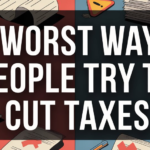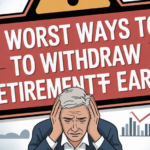For many people, early retirement is a dream. The thought of leaving behind the stress of deadlines, meetings, and long commutes to enjoy more freedom, hobbies, and time with loved ones sounds perfect. However, retiring early is not just about having enough money in the bank—it involves careful planning, realistic expectations, and strategies to handle both financial and emotional challenges.
In this blog, we’ll explore 5 things to consider before pursuing an early retirement, with examples, simple calculations, and practical insights. This way, you’ll understand how much money you need, how to prepare for healthcare, what lifestyle changes to expect, and how to make your retirement secure and meaningful.
5 Things to Consider Before Pursuing an Early Retirement
1. Define Your Retirement Lifestyle Clearly
Your lifestyle will determine the size of your retirement fund. Some people imagine early retirement as a quiet life at home, while others plan to travel the world, play golf, or pursue expensive hobbies. The more active and luxurious your lifestyle, the more money you’ll need.
Example Calculation
Let’s say you are planning to retire at 50 and live for 30 years:
- Basic lifestyle (spending ₹80,000/month):
- Annual cost = ₹80,000 × 12 = ₹9.6 lakh
- Over 30 years = ₹9.6 lakh × 30 = ₹2.88 crore
- Annual cost = ₹80,000 × 12 = ₹9.6 lakh
- Comfortable lifestyle (spending ₹1,50,000/month):
- Annual cost = ₹1.5 lakh × 12 = ₹18 lakh
- Over 30 years = ₹18 lakh × 30 = ₹5.4 crore
- Annual cost = ₹1.5 lakh × 12 = ₹18 lakh
But this is without inflation! If we add 4% annual inflation, the future expenses could double within 18 years. That means, instead of ₹5.4 crore, you might need over ₹10 crore for the same lifestyle.
👉 Tip: Write down your expected monthly expenses (housing, food, travel, hobbies, healthcare) and then calculate how much you’ll need for 25–30 years with inflation.
2. Aggressively Build Savings and Multiple Income Streams
Retiring early gives you fewer years to save and more years to spend, which makes building wealth very important. Many people follow the FIRE rule (Financial Independence, Retire Early) which says you should save 25 times your annual expenses.
Example Calculation
If your expenses are ₹18 lakh per year:
- Required savings = ₹18 lakh × 25 = ₹4.5 crore
If you want a more secure cushion (especially since you might live longer than expected), saving 30–35 times your annual expenses is safer.
How Much to Save?
Financial planners suggest saving at least 30%–50% of your income if you want to retire before 50.
- For example, if your salary is ₹30 lakh per year:
- Saving 30% = ₹9 lakh annually
- In 20 years (without investment growth) = ₹1.8 crore
- With 10% annual investment growth, you could accumulate ₹5–6 crore.
- Saving 30% = ₹9 lakh annually
Multiple Income Streams
Relying only on savings is risky. You should create multiple income sources like:
- Rental income from property
- Dividends from stocks
- Annuities (insurance products that give guaranteed monthly income)
- Side business or freelancing
This way, you won’t have to depend only on your savings, and your retirement funds will last longer.
3. Plan Carefully for Healthcare and Unexpected Expenses
Healthcare costs rise as we age, and early retirees need to cover medical expenses before government or employer-sponsored plans kick in. In India and globally, medical inflation is around 4–5% every year.
Example Calculation
Suppose your current annual healthcare cost is ₹3 lakh.
- After 10 years at 5% inflation:
₹3 lakh × (1.05)^10 ≈ ₹4.89 lakh - After 20 years:
₹3 lakh × (1.05)^20 ≈ ₹7.96 lakh
This means a medical cost that feels manageable today could triple in 20 years.
👉 You should build a health fund of at least ₹20–25 lakh (apart from your main retirement savings) to deal with medical emergencies.
Emergency Fund
Apart from healthcare, unexpected expenses like home repairs, car replacement, or family emergencies can disturb your retirement budget. That’s why financial experts advise keeping 6–12 months of expenses in liquid cash or a savings account.
Example: If your monthly cost is ₹1.5 lakh, you should keep at least ₹9–18 lakh ready as an emergency cushion.
4. Anticipate Social, Emotional, and Mental Shifts
Money is not the only challenge in early retirement. Many people face emotional and social difficulties:
- Loss of routine: After years of work, suddenly having no schedule can feel strange.
- Boredom: Without meaningful activities, you may feel restless.
- Social isolation: Friends and colleagues might still be working, leaving you lonely.
- Identity crisis: Work often defines who we are. Without it, some retirees feel lost.
Real-Life Example
Frank Noble retired at 55 and is now 86. He has lived happily in retirement because he:
- Stayed physically active (gardening, golf, walking).
- Pursued hobbies he enjoyed.
- Maintained strong relationships, especially with his wife.
His story shows that emotional planning is as important as financial planning.
👉 Tips to prepare emotionally:
- Try new hobbies before you retire.
- Build a retirement routine (exercise, reading, volunteering, part-time work).
- Maintain strong social networks (clubs, communities, online groups).
- If married, involve your partner in retirement plans to avoid relationship stress.
5. Use Strategic Withdrawal Plans and Stay Flexible
Once you retire, you need to carefully withdraw money from your savings to ensure it lasts. One common method is the 4% rule: withdraw 4% of your savings in the first year and then adjust for inflation each year.
Example Calculation
If you have ₹4.5 crore saved:
- 4% withdrawal = ₹18 lakh in the first year
- Next year, if inflation is 5%, you withdraw ₹18.9 lakh
This method usually sustains a 30-year retirement. But if you retire early, you may need a 3.5% withdrawal rate to make your savings last longer.
Market Risk
If stock markets fall soon after you retire, it could reduce your wealth quickly. To avoid this:
- Keep 2–3 years of expenses in safe investments (like fixed deposits or bonds).
- Use annuities or products like RILAs (Registered Index Linked Annuities) that provide guaranteed income with some market protection.
- Be flexible—cut down extra spending like travel or luxury purchases during bad market years.
👉 Flexibility is key: The more adaptable you are with your lifestyle and expenses, the longer your money will last.
Conclusion
Early retirement can give you more freedom, joy, and time with your loved ones—but it requires detailed preparation. You need to:
- Define your lifestyle clearly.
- Save aggressively and build multiple income streams.
- Plan for healthcare and unexpected costs.
- Prepare mentally and socially for lifestyle changes.
- Follow a smart withdrawal plan and remain flexible.
If you take care of both your financial and emotional needs, early retirement can be a rewarding journey rather than a stressful one. Start planning today—the sooner you begin, the smoother your path to early retirement will be.










